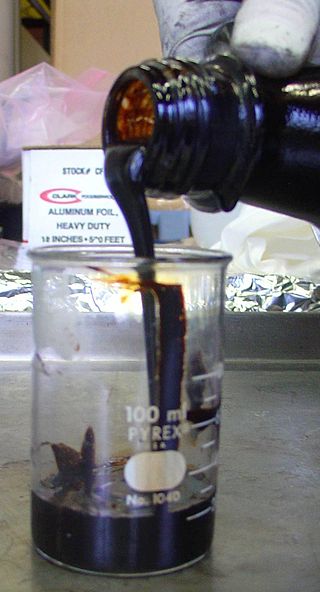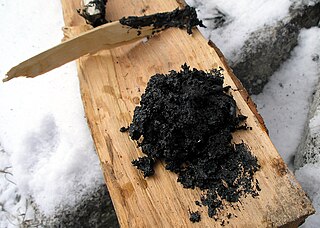Coal tar is a thick dark liquid which is a by-product of the production of coke and coal gas from coal. It is a type of creosote. It has both medical and industrial uses. Medicinally it is a topical medication applied to skin to treat psoriasis and seborrheic dermatitis (dandruff). It may be used in combination with ultraviolet light therapy. Industrially it is a railroad tie preservative and used in the surfacing of roads. Coal tar was listed as a known human carcinogen in the first Report on Carcinogens from the U.S. Federal Government, issued in 1980.

Creosote is a category of carbonaceous chemicals formed by the distillation of various tars and pyrolysis of plant-derived material, such as wood, or fossil fuel. They are typically used as preservatives or antiseptics.
In computing, tar is a computer software utility for collecting many files into one archive file, often referred to as a tarball, for distribution or backup purposes. The name is derived from "tape archive", as it was originally developed to write data to sequential I/O devices with no file system of their own, such as devices that use magnetic tape. The archive data sets created by tar contain various file system parameters, such as name, timestamps, ownership, file-access permissions, and directory organization. POSIX abandoned tar in favor of pax, yet tar sees continued widespread use.
Tarmacadam is a road surfacing material made by combining tar and macadam, patented by Welsh inventor Edgar Purnell Hooley in 1902. It is a more durable and dust-free enhancement of simple compacted stone macadam surfaces invented by Scottish engineer John Loudon McAdam in the early 19th century. The terms "tarmacadam" and tarmac are also used for a variety of other materials, including tar-grouted macadam, bituminous surface treatments and modern asphalt concrete.

Wood gas is a fuel gas that can be used for furnaces, stoves, and vehicles. During the production process, biomass or related carbon-containing materials are gasified within the oxygen-limited environment of a wood gas generator to produce a combustible mixture. In some gasifiers this process is preceded by pyrolysis, where the biomass or coal is first converted to char, releasing methane and tar rich in polycyclic aromatic hydrocarbons.

Tarring and feathering is a form of public torture where a victim is stripped naked, or stripped to the waist, while wood tar is either poured or painted onto the person. The victim then either has feathers thrown on them or is rolled around on a pile of feathers so that they stick to the tar.

The La Brea Tar Pits is an active paleontological research site in urban Los Angeles. Hancock Park was formed around a group of tar pits where natural asphalt has seeped up from the ground for tens of thousands of years. Over many centuries, the bones of trapped animals have been preserved. The George C. Page Museum is dedicated to researching the tar pits and displaying specimens from the animals that died there. La Brea Tar Pits is a registered National Natural Landmark.

Pitch is a viscoelastic polymer which can be natural or manufactured, derived from petroleum, coal tar, or plants. Pitch produced from petroleum may be called bitumen or asphalt, while plant-derived pitch, a resin, is known as rosin in its solid form. Tar is sometimes used interchangeably with pitch, but generally refers to a more liquid substance derived from coal production, including coal tar, or from plants, as in pine tar.

The IWI Tavor, previously designated as the Tavor TAR-21, is an Israeli bullpup assault rifle chambered in 5.56×45mm NATO, designed and produced by Israel Weapon Industries (IWI). It is part of the Tavor family of rifles, which have spawned many derivatives of the original design.
Tar Heel is a nickname applied to the U.S. state of North Carolina and its people. It is also the nickname of the University of North Carolina athletic teams, students, alumni, and fans.

Pine tar is a form of wood tar produced by the high temperature carbonization of pine wood in anoxic conditions. The wood is rapidly decomposed by applying heat and pressure in a closed container; the primary resulting products are charcoal and pine tar.

The Tar-Baby is the second of the Uncle Remus stories published in 1881; it is about a doll made of tar and turpentine used by the villainous Br'er Fox to entrap Br'er Rabbit. The more that Br'er Rabbit fights the Tar-Baby, the more entangled he becomes.

Tar is a dark brown or black viscous liquid of hydrocarbons and free carbon, obtained from a wide variety of organic materials through destructive distillation. Tar can be produced from coal, wood, petroleum, or peat.

The tar is a long-necked, waisted lute family instrument, used by many cultures and countries including Iran, Azerbaijan, Uzbekistan, Armenia, Georgia, Tajikistan, Turkey, and others near the Caucasus and Central Asia regions. The older and more complete name of the tār is čahārtār or čārtār, meaning in Persian "four string",. This is in accordance with a practice common in Persian-speaking areas of distinguishing lutes on the basis of the number of strings originally employed. Beside the čārtār, these include the dotār, setār, pančtār, and šaštār or šeštār.

The North Carolina Tar Heels Men's basketball program is a college basketball team of the University of North Carolina at Chapel Hill, having one of the greatest traditions in the history of college basketball. The Tar Heels have won six national championships, in addition to a Helms Athletic Foundation retroactive title (1924), and participated in a record twenty-one Final Fours. It is the only school to have an active streak of reaching the National Championship game for nine straight decades and at least two Final Fours for six straight decades, all while averaging more wins per season played (20.7) than any other program in college basketball. In 2012, ESPN ranked North Carolina No. 1 on its list of the 50 most successful programs of the past fifty years.

Birch (bark) tar or birch pitch is a substance derived from the dry distillation of the bark of the birch tree.
XZ Utils is a set of free software command-line lossless data compressors, including the programs lzma and xz, for Unix-like operating systems and, from version 5.0 onwards, Microsoft Windows. For compression/decompression the Lempel–Ziv–Markov chain algorithm (LZMA) is used. XZ Utils started as a Unix port of Igor Pavlov's LZMA-SDK that has been adapted to fit seamlessly into Unix environments and their usual structure and behavior.
The Pine Tar Incident was a controversial incident in 1983 during an American League baseball game played between the Kansas City Royals and New York Yankees at Yankee Stadium in New York City on Sunday, July 24, 1983.

The Azerbaijani Tar is a long-necked, plucked lute, traditionally crafted, and performed in communities throughout the Republic of Azerbaijan. The tar is featured alone or with other instruments in numerous traditional musical styles. It is also considered by many to be the country's leading musical instrument. The tar and the skills related to this tradition play a significant role in shaping the cultural identity of Azerbaijanis.

Tár is a 2022 psychological drama film written and directed by Todd Field. Cate Blanchett stars as Lydia Tár, a world-renowned conductor facing accusations of misconduct. The supporting cast includes Nina Hoss, Noémie Merlant, Sophie Kauer, Julian Glover, Allan Corduner, and Mark Strong. Tár premiered at the 79th Venice International Film Festival in September 2022, where Blanchett won the Volpi Cup for Best Actress. It had a limited theatrical release in the United States on October 7, 2022, before a wide release on October 28 through Focus Features.















